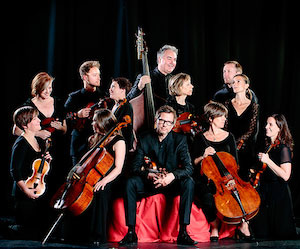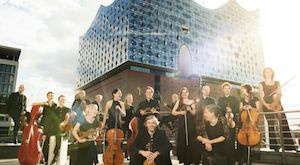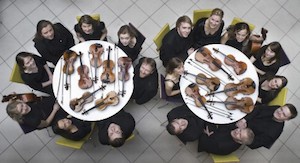Supported by the Creative Europe programme of the European Union, The Bridge is a collaboration between Scottish Ensemble (UK), Ensemble Resonanz (Germany), Trondheim Soloists (Norway) and PLMF Music Trust (Estonia). Over the course of 2 years, these four forward-thinking classical music organisations from across Europe will come together to explore, share and develop ideas around artistic innovation and audience diversity in the classical music sector, as well as initiate a string ensembles network.
The Bridge will comprise both industry-focused and public events across Scotland, Germany, Norway and Estonia, before culminating in a new three-day festival of string music. Taking place in various spaces across Glasgow in May 2020, the festival will include a major new commission as well as innovative and powerful live experiences designed to showcase the string repertoire – and classical music as a whole – in an accessible, welcoming way, to as diverse an audience as possible.

With the backdrop of the Brexit debate, and ongoing challenging negotiations surrounding the UK’s place in the European Union, it is essential that cultural organisations continue to nurture European ties. A shared cultural heritage is key to a shared European identity; in the face of political discord creative projects can act as a powerful voice of social unity. In the context of The Bridge, the rich catalogue of string music that has come out of Europe represents a significant artistic tradition, and the project’s partner organisations seek to celebrate this repertoire and its potential to move, inspire, challenge, and stimulate audiences.
The project will underline the importance of transnational artistic cooperation and learning; with perspectives from a range of European countries, The Bridge will bring together a broad range of perspectives to strengthen collective knowledge and ambition. The initial years of the project will focus on sharing good practice in audience development initiatives – to ensure more people from a range of backgrounds can experience the power of live classical music – and on developing innovative ideas in terms of performance – to ensure that our shared heritage and tradition can continue to appeal to the changing demography of the European continent.
Jenny Jamison, Chief Executive of Scottish Ensemble said:
With the UK’s imminent departure from the EU, strengthening cultural connections has become more important than ever. By fostering and protecting existing cross-cultural respect and understanding, and enriching our shared European musical heritage and finding ways to make it more accessible, responsive, diverse and innovative, we believe The Bridge can inspire long-term change within the classical music sector and encourage more people to enjoy the power of this shared musical tradition.
Why these organisations?

With the classical music sector having long grappled with a predominantly homogenous audience demographic, there is debate and concern within the industry that, in order to keep the artform vibrant, relevant and growing, it is essential to both embrace new ways of presenting classical music and diversify the audience. These questions have been relevant for at least a century, but have gained new urgency in recent years due to globalisation, consumer choice, almost unlimited digital access to music and experiences, and stretched public funding.
Scottish Ensemble, Ensemble Resonanz and Trondheim Soloists each have formidable reputations for offering new and dynamic concert experiences; they are also connected by a commitment to innovation, and a desire to develop audiences and share classical music with a more diverse group of people.
Leelo Lehtla of the PLMF Music Trust, which supports the most talented Estonian musicians through festivals, learning opportunities, and concert tours, stated:
In the free trade conditions of the EU, economic ties between countries have developed into efficient cooperation networks. Ties between organisations in the cultural field should also grow stronger and more structured. Building partnerships is a vital aspect: dynamic and self-reliant organisations need to be in dialogue with their partners in other countries in order to adapt to global trends that are impacting organisations across Europe.
A new international festival of music for strings

The Bridge culminates in May 2020 with a three-day festival of string ensembles, taking place in Glasgow (UK). The festival will centre around live public performances showcasing innovative presentation of string repertoire, taking place in unusual places and spaces across the city. Including a major commission to be announced, the combination of programmes will celebrate the diversity, history and future of the string repertoire as well as encouraging a welcoming, accessible approach to classical music performance.
Tobias Rempe, Managing Director at Ensemble Resonanz, commented:
The Bridge partners believe that European string music can have transformative impact on individuals and society, and that it is essential the sector gets better at finding meaningful ways to connect with excluded or under-represented groups. The partners do not have the resources of large symphony orchestras or institutions, but we can build meaningful projects that connect with specific target groups and exploit our flexibility and entrepreneurial approaches to find effective new ways to captivate audiences.
